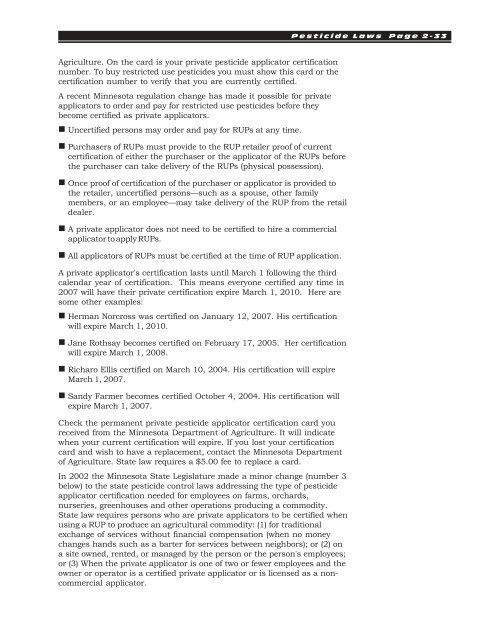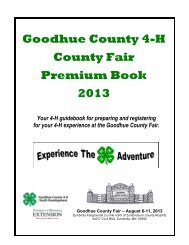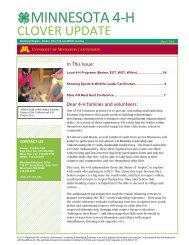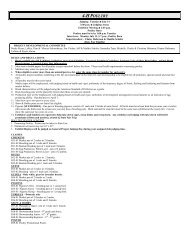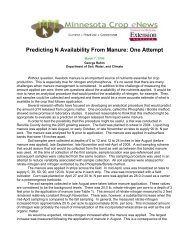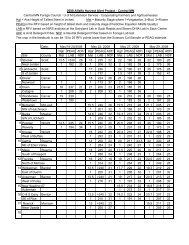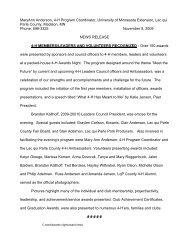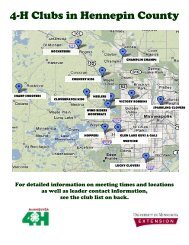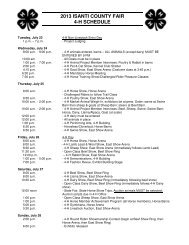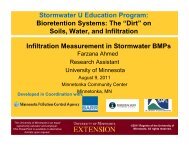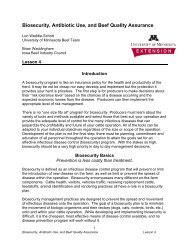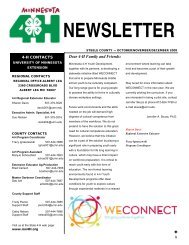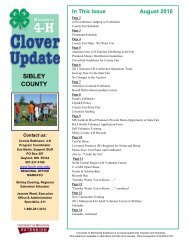Private Pesticide Applicator's Training Manual - University of ...
Private Pesticide Applicator's Training Manual - University of ...
Private Pesticide Applicator's Training Manual - University of ...
You also want an ePaper? Increase the reach of your titles
YUMPU automatically turns print PDFs into web optimized ePapers that Google loves.
Agriculture. On the card is your private pesticide applicator certification<br />
number. To buy restricted use pesticides you must show this card or the<br />
certification number to verify that you are currently certified.<br />
A recent Minnesota regulation change has made it possible for private<br />
applicators to order and pay for restricted use pesticides before they<br />
become certified as private applicators.<br />
� Uncertified persons may order and pay for RUPs at any time.<br />
� Purchasers <strong>of</strong> RUPs must provide to the RUP retailer pro<strong>of</strong> <strong>of</strong> current<br />
certification <strong>of</strong> either the purchaser or the applicator <strong>of</strong> the RUPs before<br />
the purchaser can take delivery <strong>of</strong> the RUPs (physical possession).<br />
� Once pro<strong>of</strong> <strong>of</strong> certification <strong>of</strong> the purchaser or applicator is provided to<br />
the retailer, uncertified persons—such as a spouse, other family<br />
members, or an employee—may take delivery <strong>of</strong> the RUP from the retail<br />
dealer.<br />
� A private applicator does not need to be certified to hire a commercial<br />
applicator to apply RUPs.<br />
� All applicators <strong>of</strong> RUPs must be certified at the time <strong>of</strong> RUP application.<br />
A private applicator's certification lasts until March 1 following the third<br />
calendar year <strong>of</strong> certification. This means everyone certified any time in<br />
2007 will have their private certification expire March 1, 2010. Here are<br />
some other examples:<br />
� Herman Norcross was certified on January 12, 2007. His certification<br />
will expire March 1, 2010.<br />
� Jane Rothsay becomes certified on February 17, 2005. Her certification<br />
will expire March 1, 2008.<br />
� Richaro Ellis certified on March 10, 2004. His certification will expire<br />
March 1, 2007.<br />
� Sandy Farmer becomes certified October 4, 2004. His certification will<br />
expire March 1, 2007.<br />
Check the permanent private pesticide applicator certification card you<br />
received from the Minnesota Department <strong>of</strong> Agriculture. It will indicate<br />
when your current certification will expire. If you lost your certification<br />
card and wish to have a replacement, contact the Minnesota Department<br />
<strong>of</strong> Agriculture. State law requires a $5.00 fee to replace a card.<br />
In 2002 the Minnesota State Legislature made a minor change (number 3<br />
below) to the state pesticide control laws addressing the type <strong>of</strong> pesticide<br />
applicator certification needed for employees on farms, orchards,<br />
nurseries, greenhouses and other operations producing a commodity.<br />
State law requires persons who are private applicators to be certified when<br />
using a RUP to produce an agricultural commodity: (1) for traditional<br />
exchange <strong>of</strong> services without financial compensation (when no money<br />
changes hands such as a barter for services between neighbors); or (2) on<br />
a site owned, rented, or managed by the person or the person's employees;<br />
or (3) When the private applicator is one <strong>of</strong> two or fewer employees and the<br />
owner or operator is a certified private applicator or is licensed as a noncommercial<br />
applicator.<br />
<strong>Pesticide</strong> Laws Page 2-33


